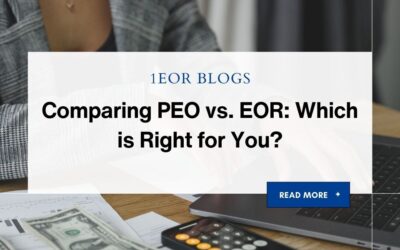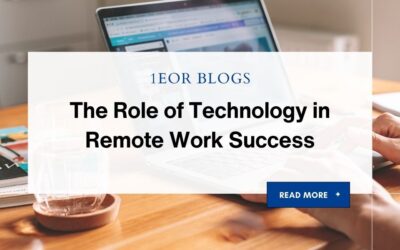In the evolving landscape of global business, companies are continually seeking innovative solutions to streamline their operations and maximize their workforce efficiency. One such solution that has gained significant traction is the concept of an Employer of Record (EOR). Understanding what an EOR is and how it can benefit your business is crucial for navigating the complexities of employment, especially in a remote or international context. This article delves deep into the definition of an Employer of Record, explores its advantages, and offers insights into how it can enhance your business operations.
Understanding the Concept of an Employer of Record (EOR)
An Employer of Record (EOR) is a third-party organization that takes on the legal responsibilities of being an employer for a company’s workforce. This arrangement allows businesses to hire employees in various jurisdictions without needing to establish a legal entity in each location. The EOR manages payroll, benefits, compliance with labor laws, and other human resource functions, allowing companies to focus on their core operations.
This model is particularly beneficial for organizations looking to expand into new markets or manage a distributed workforce. By leveraging the expertise of an EOR, businesses can mitigate the complexities associated with employment law compliance, tax regulations, and employee benefits administration.
Key Functions of an EOR
To fully grasp what an Employer of Record (EOR) entails, it’s essential to highlight its primary functions. These typically include:
- Payroll Management: The EOR handles all aspects of payroll processing, including calculating wages, withholding taxes, and ensuring timely payment to employees.
- Benefits Administration: EORs provide access to benefits such as health insurance, retirement plans, and other perks, which can be a significant draw for talent.
- Compliance Assurance: EORs ensure that all employment practices align with local labor laws and regulations, reducing the risk of legal issues for the client company.
- Employee Onboarding: The EOR facilitates the onboarding process, helping new hires navigate their roles and understand their benefits.
- Termination Handling: Should the need arise, the EOR also manages the offboarding process, ensuring compliance with local laws regarding employee termination.
By handling these critical functions, an EOR allows businesses to reduce their administrative burden, enabling them to focus on growth and strategy rather than HR management.
Advantages of Using an EOR
Implementing an Employer of Record (EOR) can provide several strategic advantages for businesses. Understanding these benefits can help organizations make informed decisions about their employment strategies.
1. Simplified Global Expansion
Expanding into new territories can be a complex endeavor, laden with regulatory hurdles and operational challenges. An EOR simplifies this process by allowing companies to hire employees in new markets without the need for a local entity. This means businesses can enter international markets more rapidly and efficiently.
2. Cost Savings
Establishing a legal entity in a foreign country can be prohibitively expensive. By using an EOR, businesses can avoid the costs associated with incorporation, legal fees, and the complexities of local tax systems. The EOR handles all these aspects, often leading to substantial cost savings.
3. Risk Mitigation
Compliance with local labor laws is critical, but it can be challenging, especially for businesses unfamiliar with the regulations in different regions. An EOR has the expertise to navigate these complexities, significantly reducing the risk of non-compliance and the associated penalties.
4. Access to Talent
With an EOR, businesses can tap into a broader talent pool without geographical limitations. This flexibility is particularly valuable in a competitive job market where attracting and retaining top talent is essential for success.
5. Improved Employee Experience
An EOR can enhance the employee experience by providing a seamless onboarding process, comprehensive benefits packages, and efficient payroll management. Happy employees are more productive and engaged, ultimately benefiting the organization.
How an EOR Operates: A Closer Look
Understanding the operational framework of an Employer of Record (EOR) is vital for businesses considering this model. Here’s a closer look at how an EOR typically operates:
- Client Agreement: The business enters into an agreement with the EOR, outlining the scope of services, roles, and responsibilities.
- Hiring Process: The client company identifies potential employees. The EOR conducts necessary background checks, interviews, and compliance assessments.
- Onboarding: Once candidates are selected, the EOR facilitates the onboarding process, including necessary paperwork and orientation.
- Payroll and Benefits: The EOR processes payroll, manages employee benefits, and ensures compliance with local labor laws.
- Ongoing Support: Throughout the employment term, the EOR provides continuous support, addressing any HR-related issues that arise.
Table: Comparison of EOR vs. Traditional Employment Models
| Feature | EOR | Traditional Employment |
|---|---|---|
| Entity Requirement | No need for a local entity | Must establish a local entity |
| Compliance Management | Handled by EOR | In-house responsibility |
| Payroll Processing | Managed by EOR | Managed by the business |
| Employee Benefits | Provided by EOR | Must be arranged by the business |
| Speed of Hiring | Faster due to streamlined processes | Slower due to legal and regulatory steps |
This comparison highlights the efficiency and advantages of utilizing an Employer of Record over traditional employment models, particularly for companies looking to expand or hire in multiple locations.
Frequently Asked Questions about EOR
To further clarify the role of an Employer of Record (EOR) and its implications for your business, here are some frequently asked questions:
1. What types of businesses benefit from using an EOR?
Any business looking to expand its workforce into new territories or manage a remote team can benefit from an EOR. This includes startups, small to medium enterprises (SMEs), and large corporations.
2. Is using an EOR expensive?
While there are costs associated with using an EOR, they often outweigh the expenses incurred when establishing a local entity. Additionally, the savings from reduced legal compliance risks and administrative overhead can make EORs a cost-effective solution.
3. How does an EOR handle payroll taxes?
The EOR is responsible for withholding and remitting payroll taxes in accordance with local regulations. This takes the burden off the client company and ensures compliance.
4. Can I maintain control over my employees if I use an EOR?
Yes, businesses can maintain control over their employees’ day-to-day activities while the EOR handles the administrative responsibilities. This allows for operational flexibility and autonomy.
5. What happens if I need to terminate an employee?
The EOR manages the termination process, ensuring compliance with local labor laws. This can significantly reduce the risk of potential legal issues for the client company.
6. Are EOR services suitable for remote workforces?
Absolutely! EORs are particularly beneficial for managing remote workforces as they can handle compliance and payroll across different jurisdictions seamlessly.
7. How do I choose the right EOR for my business?
When selecting an EOR, consider factors such as their expertise in your industry, reputation, service offerings, and pricing structure. A thorough assessment will help you find the right partner.
8. Can an EOR help with employee benefits?
Yes, EORs typically offer a range of employee benefits options, including health insurance and retirement plans, enhancing your ability to attract and retain talent.
Conclusion
In conclusion, understanding what an Employer of Record (EOR) is and how it can help your business is crucial in today’s competitive landscape. By leveraging an EOR, businesses can streamline their hiring processes, ensure compliance, reduce risks, and access a broader talent pool without the burden of establishing a local entity. This model not only simplifies operations but also empowers organizations to focus on their core objectives.
As your business navigates the complexities of employment in various markets, considering an Employer of Record could be the strategic advantage you need to thrive. By embracing this model, you can enhance your operational efficiency and ultimately drive growth and success.
Read More: How EOR Is An IT Staffing Solution For Non-It Companies?



